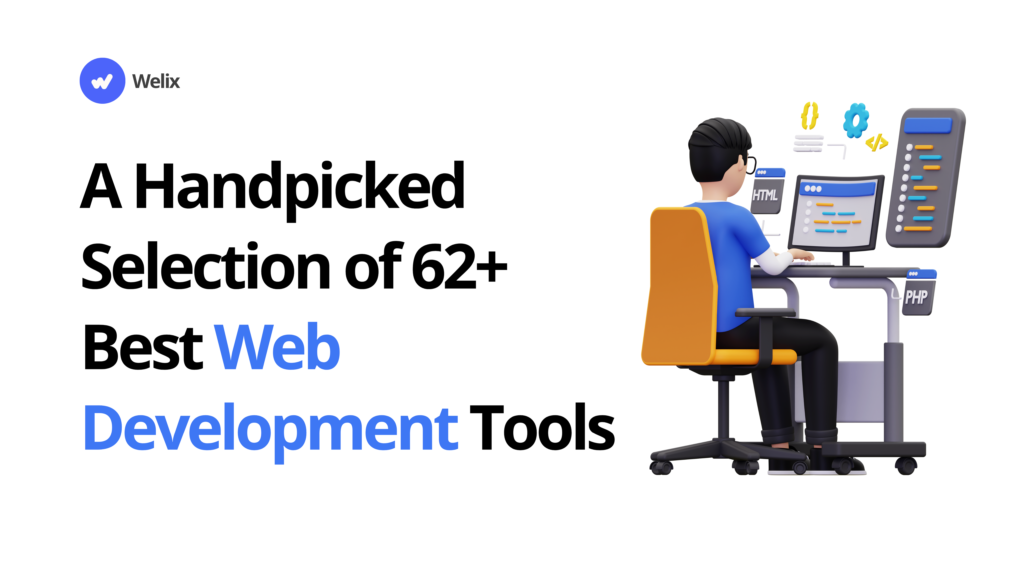A Handpicked Selection of 62+ Best Web Development Tools – Welix Digital


Quick Summary
Web development tools work as the building blocks for creating successful web-based digital products. But when it comes to choosing the ideal one or more to develop powerful and reliable platforms, there are quite a few options. To clear the confusion, we’ve meticulously created a checklist of the best web development tools for 2024 and beyond. Let’s check them out!
According to a recent study published by Forbes, an astounding number of 10,500 new websites get launched every single hour.
Here’s a rather intriguing nugget of insight: a whopping 94% of that initial impression depends on the visuals and performance of the website.
Yes, you read that right – a well-designed and well-developed product holds immense influence over how we perceive a brand.
Where are we getting at with this?
Given the abovementioned stats, the art of web development takes on a new level of importance for web developers, and so does the complexity and difficulty level.
Whether you’re a newbie, a professional developer, or you run an aspiring web development company, developing a web platform that surpasses your client’s expectations and makes a positive impact is a formidable task.
However, the Welix Digital team has observed that the right web development tools can make all the difference.
You don’t need to work harder; instead, work smarter so that you can get more done in less time and effort.
So, what are the best web development tools out there? We’ve rounded up a tried-and-tested list of the prime tools for web developers to get their websites up and running.On This Page
- What are Web Development Tools?
- Why Should You Use Web Development Tools?
- Best Web Development Tools Recommended for Developers
- Factors to Consider Before Choosing Web Development Tools
- Tips to Choose the Best Web Development Tool
- Final Takeaways
What are Web Development Tools?
A web development tool is a software program, application, framework, library, or even online platform that helps you design, build, test, and manage websites and web applications.
These tools come in different shapes and sizes, each providing support at various stages of the entire web development process.
Some of these tools help designers with particular tasks, such as creating visually appealing layouts and graphics. Others work as robust building blocks for developers, like offering functionalities for writing, testing, and debugging code.
Hence, whether you’re a beginner or a seasoned developer, web developer tools help you execute your web projects with efficiency and finesse. From text editors and IDEs to graphic design tools and version control systems, these tools cover a wide range of needs for anyone involved in developing websites.
Frontend vs Backend Web Development Tools
Before you start exploring the list of web development tools, it’s crucial to grasp the fundamental distinction between frontend and backend web development tools.
In simpler terms, frontend web development tools help in building the interface and functionalities that users directly interact with. These tools empower developers to create graphic elements, animations, eye-catchy fonts, etc.
On the flip side, backend development tools play a different role. They streamline the behind-the-scenes process of developing a server and managing user data. Their focus is on simplifying the intricate task of creating the unique logic that works under the hood.
It’s worth noting that certain web development tools, particularly IDEs, are versatile. Teams can effectively utilize them in both the frontend and backend.
Why Should You Use Web Development Tools?
Are you wondering why web development tools are worth a developer’s attention?
Whether you’re a business owner, a freelancer, or simply someone who wants to pursue their coding passions, the best tools for web development offer a plethora of benefits that can make creating and managing websites or web apps not only smoother but also more enjoyable.
- First and foremost, these tools help developers save time and effort as they can automate much of the development process. This allows you to focus on the critical work rather than dealing with the technical nitty-gritty.
- Then comes responsiveness. Tools used for web development include responsive design features and ensure your site is engaging whether it’s on a desktop computer, tablet, or smartphone.
- Easy usability is another credible reason to embrace these tools. Many of them feature user-friendly and readily available interfaces that help developers from various backgrounds easily build and maintain websites.
- Another compelling reason to utilize these tools is community support. Online forums, tutorials, and active user communities provide a safety net of knowledge, help you troubleshoot issues, and learn new techniques.
- Lastly, let’s not forget about customization. Web development tools often come with a wide array of bespoke templates, themes, and plugins to suit your specific needs.
In conclusion, the question shouldn’t be “Why should you use web development tools?” but rather “Why wouldn’t you?!”
Best Web Development Tools Recommended for Developers
Okay, no more beating around the bush; let’s dive straight into the compilation of the top tools for web developers that we believe are worth using in 2024.
Many of the tools mentioned here are integral parts of Welix Digital daily operations. While we can’t cover everything, we’re excited to share a few of our top picks along with some commonly used options. For better understanding, we have divided these tools into 10 categories with no specific order:
- Code and Text Editors
- Local Development Environments
- Frontend Frameworks
- Git Clients/Git Services
- Web Application Frameworks
- Package Managers
- Web Design and Prototyping Tools
- API and Testing Tools
- Collaboration Tools
- Website Testing Tools
Now, let’s talk about the tools of each category, followed by their descriptions:
Code and Text Editors
Text editors empower web developers to carry out their work with speed and precision. Selecting the perfect text editor is critically important as it becomes a go-to tool throughout their careers. Fortunately, you can’t go wrong with the options listed below:

1. Visual Studio Code
This editor has redefined code editing, tailored for crafting and debugging contemporary web and cloud applications.
2. Sublime Text
For those dealing with coding, markup, or even prose, Sublime Text offers a sophisticated platform with exceptional performance.
3. Notepad++
If you’re working in the MS Windows environment, this free source code editor has your back. It supports various programming languages.
4. Atom
This text is definitely one of our favorites. It seamlessly blends modern design with approachability, while also being customizable at its core.
5. TextMate
If you’re on an OS X system, TextMate is your go-to for editing code and markup.
6. WebStorm
Whether it’s intricate client-side development or server-side work with Node.js, this lightweight yet potent IDE is well-equipped.
7. Coda 2
Designed for OS X, Coda 2 stands out with its speed, cleanliness, and robust capabilities as a text editor.
8. Brackets
Crafted using JavaScript, HTML, and CSS, this lightweight yet powerful text editor is a modern choice for many.
9. Vim
Offering extensive configurability, Vim stands as a versatile text editor built to facilitate efficient text manipulation.
10. Emacs
Known for its extensibility and adaptability, Emacs is a customizable text editor equipped with features for quick text and code modifications.
Local Development Environments
Based on the operating system you currently have access to or the computer you’re using, you might need to set up a quick local development environment.
There are several free web development tools available that package together software like phpMyAdmin, MySQL, and Apache. These packages can be very useful for rapidly testing any code on your own computer.
Let’s explore a few standout options:
11. MAMP
If you’re on an OS X or Windows system, you can opt for MAMP, which sets up a local server environment in just a few seconds.
12. XAMPP
It’s a completely free and user-friendly distribution of Apache that includes Perl, PHP, and MariaDB. It’s easy to install and get started with.
13. LAMP
LAMP is an abbreviation for Linux, Apache, MySQL, and PHP. It has the same functionalities as XAMPP and MAMP, except it works for Linux servers.
14. Laragon
Another choice is Laragon, which is particularly useful for Windows users. It includes tools like Apache, PHP, Redis, MySQL, and Memcached, hence it’s an excellent choice when working on your Laravel projects.
15. Vagrant
For those looking to create and manage portable, lightweight, and reproducible dev environments, Vagrant is a great option.
16. WampServer
This is one of the best web app development tools designed for Windows. It lets you build progressive web apps using PHP, MySQL, and Apache2 database.
Leverage Our Enterprise Web Development Solutions Designed to Empower Your Brand on a Global Scale
Frontend Frameworks
Front-end frameworks, often referred to as “CSS frameworks,” consist of standardized and pre-written code bundles designed for seamless integration. These are coding toolkits that optimize the frontend development process with easily accessible solutions. This saves you from writing the code from scratch.
Here are some popular front-end web development tools:
17. Bootstrap
We’re a big fan of Bootstrap. This framework supports JavaScript, CSS, and HTML, which works as a foundation for responsive, mobile-first web platforms.
18. Semantic UI
This is one of developers’ favorite web development platforms that help you create aesthetically pleasing and responsive layouts through user-friendly HTML.
19. Materialize
Based on Google’s Material Design language, this next-gen framework unifies user experience across any environment and platform.
20. Foundation
A group of robust frontend frameworks that simplify the creation of visually appealing websites as well as HTML emails suitable for all devices and mediums.
21. Uikit
A nimble and modular frontend framework tailored for the swift development of powerful and efficient web interfaces.
For deeper insights, read our compilation of the top 5 frontend frameworks for web development.
Git Clients/Git Services
A Git client serves as your tool for interacting with Git repositories, whether you have stored them locally or remotely. It’s the software that enables you to manage your Git projects effectively, including tasks like pushing changes and staging modifications.
There’s a variety of Git clients tailored to different operating systems. Take, for instance:
22. GitLab
The list of the best website development tools is incomplete without GitLab. This is a comprehensive platform where you can host both your private and public software projects without any cost involved.
23. SourceTree
This is a complimentary Git and Mercurial client designed for both Windows and Mac users. Additionally, Atlassian offers an impressive team-oriented Git client named Bitbucket.
24. GitHub Desktop
Streamlining your contributions to projects on GitHub and GitHub Enterprise, this client provides a smooth and convenient experience.
25. Gogs
Built on the Go language, Gogs stands out as a self-hosted Git service that delivers effortless management of repositories.
26. GitKraken
An intuitive, swift, and visually engaging Git client that operates seamlessly across different platforms.
27. Tower 2
A user-friendly application that simplifies version control using Git. It’s designed to offer a combination of aesthetics, efficiency, and robust functionality.
Web Application Frameworks
In layman’s terms, frameworks of this type are software libraries that make the web application development process much easier. They are there to ease the pain and challenges that come with developing these online tools.
Take a look at this curated of the best web application development tools available today:

28. Angular.js
Developed by Google, this cross-platform framework enables you to expand the capabilities of HTML for your web apps with a bunch of third-party plugins.
29. React.js
Built by Meta, React is one of the greatest frontend web development tools for building complex and interactive UIs. As one of the best JavaScript frameworks, it powers many modern WordPress elements.
30. Vue.js
This is another popular JS framework that stands as the major rival to Angular and React. It’s easy to use and offers extensive documentation and templates for beginners.
31. Ruby on Rails
This is a comprehensive framework that provides everything you need to build data-oriented web applications. It follows a model-view-controller (MVC) pattern.
32. Meteor.js
This is a powerhouse platform for JavaScript, covering both the web and mobile app realms. It assembles all the necessary elements to create modern apps using a single JavaScript codebase.
33. Ember.js
If you’re aiming to create complex and ambitious web applications, Ember.js is the framework for the job.
34. Django
Written in Python, Django is a high-level framework that facilitates Welix application development with clean, practical designs.
35. Express.js
When it comes to Node.js, Express is a speedy and minimalist framework for building web applications.
36. ASP.NET
Offering support and free to use, ASP.net is a framework tailored for web apps. It helps you construct web solutions that follow established standards.
Create a Powerful Web Application That’s Not Only Functional but Also Engaging and Intuitive
Package Managers
Installing and working with multiple programs is a considerable hassle for developers. This involves visiting each website, downloading the installation files, and then meticulously setting up each program one by one.
This is where the concept of package managers comes into play. These useful web development tools automate and streamline the entire procedure of installing, upgrading, configuring, and uninstalling programs.
Let’s have a look at a few of these package managers:
37. Grunt
This tool functions as a JavaScript task runner, primarily focused on automating tasks.
38. Yarn
Known for its stability and speed, Yarn is gaining immense popularity for its comprehensive documentation and quick installation.
39. npm
A package manager tailored specifically for JavaScript, making it easy to manage various libraries and dependencies.
40. Gulp
Geared towards simplicity, Gulp excels in making intricate tasks more manageable. It not only automates processes but also improves your overall workflow.
41. Webpack
This tool serves as a module bundler, ideal for modern JavaScript applications.
42. Bower
Designed as a web package manager, Bower specializes in handling components containing CSS, HTML, JavaScript, fonts, and even image files.
Web Design and Prototyping Tools
Simply knowing how to program is only part of the equation. As a web developer, it’s crucial to grasp the fundamentals of effective UI and UX design.
From wire-framing and MVP development to prototyping and creating a consistent visual identity for your web products, these web design tools are worth your time and attention:

43. Figma
A collaborative design tool that’s like Google Docs for design. It allows real-time collaboration and interactive prototyping.
44. Adobe XD
This is Adobe’s platform for creating user interfaces that provides seamless integration with other Adobe products and powerful prototyping capabilities.
45. InVision
Offers end-to-end design-to-prototype workflows, facilitating design collaboration, user testing, and interactive animations.
46. Sketch
A macOS-only web design and prototyping tool known for its user-friendly interface and extensive library of plugins.
47. Axure RP
A robust tool for creating complex interactive prototypes with dynamic content, suitable for detailed web design and interaction design.
API and Testing Tools
APIs play a crucial role in the current landscape of web development. However, managing, creating, or integrating them can sometimes pose challenges.
Luckily, we’ve got a range of tools used by web developers, as follows, that come to the rescue:
48. Runscope
It’s a very handy and efficient tool for testing, monitoring, and debugging API performance. It’s an invaluable asset for ensuring APIs function optimally.
49. HoppScotch
This platform is a perfect balance between advanced web development functionalities and beautiful design elements.
50. REST-assured
An ingenious tool to test and evaluate REST and RESTful APIs with dynamic languages like Java and Ruby.
51. Postman
It’s a complete environment for API development, covering everything from initial design to testing, monitoring, and even publishing.
52. SoapUI
A powerful tool tailored for testing REST and SOAP APIs. It goes beyond basic functionality and offers functional testing, performance testing, and security testing.
Witness the Future with a Progressive Web App That Delivers Unparallel Digital Experience at Speed and Scale
Collaboration Tools
We’ve pretty much covered all the technical examples of web development tools. However, whether you’re working at an agency, going solo, or a part of an in-house team, collaboration tools are as important as your testing tool.
Below, you’ll find a collection of web-based development tools that can greatly help you establish clear and effective communication channels across your team:

53. Trello
Offering a versatile and visual approach, Trello helps you organize tasks and projects in collaboration with others.
54. Asana
Tailored for team collaboration, Asana serves as a tool for tracking work progress and outcomes.
55. Slack
This messaging app is designed for teams, with a mission to simplify, enhance the quality of, and boost productivity in your work life.
56. Jira
Specifically built to cater to every member of your software team, Jira helps in planning, tracking, and successfully launching web-based systems.
57. Glip
A real-time messaging platform that seamlessly integrates task management, video conferencing, shared calendars, and more.
Web Testing Tools
Earlier, we discussed the importance of testing both your API and core site code. However, it’s crucial not to overlook the performance aspect of your website. Let’s delve into some of our favorite tools that can help you assess the performance of your websites.
58. Selenium
It’s an open-source framework that automates web browsers. Using various programming languages, you can test web apps across different browsers and platforms.
59. BrowserStack
A cloud-based cross-browser testing tool that allows you to test your website on a wide range of browsers and devices.
60. TestComplete
Another comprehensive automated testing platform that offers UI testing, functional testing, and regression testing with various scripting languages.
61. LambdaTest
LambdaTest is a testing platform that offers cross-browser testing, automated screenshot testing, and real-time interactive testing.
62. Google Lighthouse
As an open-source automated tool, Lighthouse provides audits for performance, accessibility, best practices, and SEO to optimize your site.
Factors to Consider Before Choosing Web Development Tools
Before making a decision on which tool to use, it’s crucial to thoroughly assess the must-have characteristics so that you don’t invest in an option that might not deliver the best results.
To make the job easier, consider the following criteria:
Scalability – It’s essential for a web development tool that can seamlessly adapt to changing demands and increasing workloads. It definitely should have the flexibility to handle the evolving requirements of your project.
Functionality – Your choice of web dev tools should align with the specific goals and objectives of your business. It should offer key features that can deliver the functionalities you want on your site.
User-Friendliness – Choose a tool that doesn’t have a steep learning curve for your team, even for expert web developers. Ideally, choose a tool that offers a user-friendly experience with a drag-and-drop feature for ease of use.
Cost – The best web development tools are either budget-friendly or even free. If you’re considering a paid tool, it’s wise to opt for one that offers a free trial period.
Security – Prioritize web development tools that come with multilayer security features so that you can ensure the protection of sensitive information of yours as well as users.
Portability – Accessibility is paramount. Developers must be able to continue their work regardless of their location – at home, office, or any other remote setting.
Tips to Choose the Best Web Development Tool
Apart from this list of the best web development tools, we’ve jotted down a few tips and insights to help you pick out the ideal web development technology for your project:
- Don’t focus on the short-term swings of price. Just because it has a high price doesn’t mean you’ll get the most value out of it. Test the tools by yourself and see their impact before making a decision.
- Selecting a web development tool is a long-term investment as you can’t change it halfway through the project. Hence, make sure your future development goals align with the capabilities of the tool.
- Consider the end users of the tool. Can the chosen tool address the specific pain points of your team? Listen to their feedback to choose the best option.
Final TakeawaysCrunch time – this is a dreaded phrase that calls for the time and resource-saving benefits of web development tools. Developers always run out of time and resources and there’s always some logic to using web dev tools to save both. They can automate the mundane day-to-day tasks and do the heavy lifting for you while you focus on the strategic part of your project.Did any tool from this catch your attention? The web is an infinite space, and it can be overwhelming at times, especially if you have just started. But the good news is that you can always get help from fellow developers who’ve been in your shoes and achieved fineness! Welix Digital houses a team of expert web developers who have in-depth knowledge and experience in building an array of web-based products, such as websites, web applications, web portals, and so on. We always keep tabs on cutting-edge tools and play around with them to find the ideal tech stack for the most optimal project outcomes.Whether you need help with choosing the right tool, exploring more options, or troubleshooting issues with your existing stack, we’ve got your back. Contact us today!